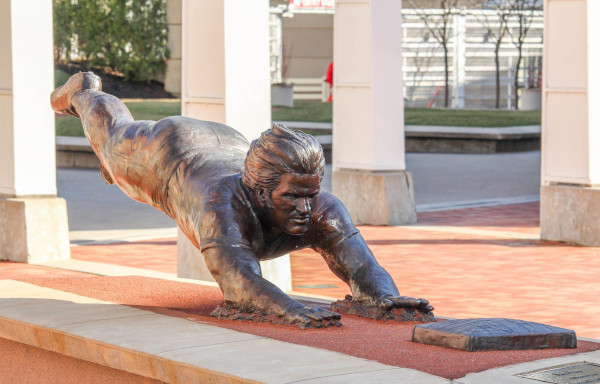A misplaced morality in sports
Reckoning with Pete Rose’s thorny past, 55 years later
A Cincinnati statue of Pete Rose still stands five years after the controversial baseball player was accused of statutory rape. (Supplied photo)
Roger Clemens won seven Cy Young Awards. Barry Bonds has seven MVP titles. Both names are practically metonyms for the sport itself but will now be removed from future Hall of Fame ballots. Their only chance at Cooperstown enshrinement is through the vote of veterans’ committees, because they used performance-enhancing drugs.
As Snyder points out, “the Hall of Fame already has plenty of not-so-great human beings. Whether racists, drunkards, abusers or anything else unseemly, it’s hardly a collection of sainthood.”
But players like Clemens, Bonds and Pete Rose committed what much of the sports world considers cardinal sins: crimes against baseball itself.
Rose opened his professional baseball career with a series of “accomplishments that would make any player jealous,” including a Rookie of the Year nod, 17 all-star appearances and three World Series titles. However, the second half of his career “reads more like a rap sheet,” Philadelphia Inquirer sports editor Matt Mullin writes.
He received “multiple suspensions as a manager for betting on baseball, followed by his permanent ban, tax evasion and worse.” But “what isn’t often highlighted prominently when discussing Rose’s legacy is the worst accusation against him: statutory rape.”
These allegations surfaced as part of a federal-court testimony in 2017. A woman claims Rose “began a sexual relationship” with her in 1973, when she was younger than the age of consent. If mentioned at all, these allegations read “like a footnote in the long and winding history of Rose’s life and career,” Mullin explains, which is likely “more than enough for the former Phillies first baseman.”
During a controversial appearance at a 1980 Phillies World Series celebration this summer, Inquirer reporter Alex Coffey asked Rose about the negative message his presence at the World Series team event could send to women. His response? “No, I’m not here to talk about that. Sorry about that. It was 55 years ago, babe.”
Those three short, belittling sentences echo what many victims intrinsically know: sports aren’t for us.
Physical, sexual and emotional abuse are still rampant in women’s gymnastics, even though serial abuser Larry Nassar has been sentenced to more than a century in prison. According to an Angus Reid poll, most Canadians describe sexual misconduct as “a major issue” in youth hockey.
Los Angeles Dodgers pitcher Trevor Bauer is currently serving a two-year suspension for violating Major League Baseball’s domestic-violence and sexual-assault policy. The NFL recently suspended quarterback Deshaun Watson for 11 games after 24 women accused him of sexual misconduct.
Pro sports leagues repeatedly dole out short suspensions and miniscule fines for abuse accusations – and that’s if incidents are reported and athletes penalized at all. Despite his regular-season suspension, Watson recently started a preseason game against the Jacksonville Jaguars, to little protest.
Rose’s lifetime ban from professional baseball speaks to a misplaced morality in sports. He’s idolized as the league’s all-time hits leader but vilified for a betting scandal. He’s immortalized while his “darker and much more serious” alleged crimes are swept under the rug.
As the Association for Women in Sports Media tweeted on Aug. 7, “there is no statute of limitations on accountability.” That same week, I watched a man accused of domestic violence play professionally. I panic when teams begin to announce their spring-training rosters, wondering each time if this is the year my abuser returns to the sport.
Maybe, when the rest of the sports world finally holds athletes accountable for their crimes on and off the field, my distress will subside. After all, “no time period in baseball is clean.” It’s time we recognize the full scope of what that truly means.
A former sports broadcaster, Danielle Doiron is now a writer, editor and educator. Find her in Winnipeg, Philadelphia, Fargo and, occasionally, on the airwaves.
Published in Volume 77, Number 01 of The Uniter (September 8, 2022)







